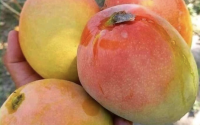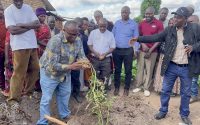Laws and Regulations for Seeds
LAWS AND REGULATIONS FOR SEEDS (TOSCI)
SEED ACT NUMBER 18 OF 2003 and its 2014 amendment, AND ITS 2007 REGULATIONS and its 2017 amendment.
WHAT IS A SEED? • A seed is a part of a crop that is used for planting.
• Good seeds are those that have undergone research, have been examined and certified for quality.
• The characteristics of good seeds include their ability to germinate, their purity, their stability and their freedom from diseases.
• Agricultural seeds are divided into two categories: Pure Seeds and Certified Seeds.
SEED GRADING • Mother Seed – Research
• Basic Seed – Research
• Foundation Seed – ASA
• Certified Seed 1 & 2 – Private companies
• Quality Declared Seeds (QDS) – Small-scale farmers
BASIC SEED It is a seed that is derived from the mother seed and the researcher is advised to multiply it to increase the seed quantity so that it can be available for seed distributors. These distributors include the Agricultural Seed Agency (ASA) and registered private companies. This seed grade is identified by TOSCI with a white label that has the TOSCI label printed in blue.
FOUNDATION SEED • It is a seed that is derived from the basic seed and it is produced by the Agricultural Seed Agency (ASA) and registered private companies for seed production in the country. This seed grade is identified by TOSCI with a white label.
CERTIFIED SEED 1 (C1) • It is a seed that is derived from the foundation seed (B) and it is produced by the Agricultural Seed Agency (ASA) and registered private companies for seed production in the country. This seed grade is identified by TOSCI with a blue label.
CERTIFIED SEED 2 (C2) • It is a seed that is derived from the certified seed 1 (C1) and it is produced by the Agricultural Seed Agency (ASA) and private companies for food crop producers. This seed grade is identified by TOSCI with a black label.
SEED QUALITY CONTROL PROCEDURES • Seed quality is controlled in three ways:
- Expertise
- Administration
- Legal
EXPERTISE • Controlling the legality of seeds
• Checking seed grades
• Examining the minimum quality standards
• Conducting seed quality field trials
ADMINISTRATION • Registering all seed businesses
• Receiving applications from those who want to produce seeds each season
• Issuing seed sale permits
• Monitoring the movements of seeds in the market
LEGAL • Taking into account the Seed Act of 2003 and its 2014 amendment
• Taking into account the 2007 Seed Regulations and their 2017 amendment
• TOSCI is given the authority to enforce the laws and regulations for seeds
Seed procedures both inside and outside the country • Planting
• Cutting
• Distributing
• Selling
Information about seed packaging • The name and address of the seed owner
• The name of the crops
• The type of seed
SEED CERTIFICATION INFORMATION • Seed producer name and address • Brand name • Seed type • Seed grade • Lot number • Percentage of germination, vigor, and purity • Certification weight • Month and year of seed quality evaluation
SEED SALE REGULATIONS • Type of seed approved for sale • Quality and quantity required • Seller must be registered with TOSCI and have a certificate as a seed dealer
THINGS TO CONSIDER i. Obtaining a seed sale permit from TOSCI; ii. Receiving training on TOSCI recognized seed varieties iii. Selling seeds that have been evaluated for quality and have a TOSCI label; iv. Maintaining the quality of seeds sold;
THINGS TO CONSIDER V. Selling seeds in certified seed packages that show important seed information; VI. Keeping records of seed purchases and sales in the business area VII. Opening seed packages and separating them into different packages from their original package
REGISTRATION REQUIREMENTS FOR SEED SALE • Application letter • Seed expertise certificates • Completed application form • TIN number • Business license • Seed business plan
VIOLATION OF LAWS AND PENALTIES • Issuing a stop sale order • Fine and imprisonment together • Fine amount ranging from 100,000,000 – 500,000,000/= • Imprisonment of 5-12 years
REQUIREMENTS FOR SMALL-SCALE SEED PRODUCERS OF QDS • Received training in seed production technology • Has suitable land for seed production • Has the ability to obtain basic or certified seeds • Can access TOSCI services • Maintains seed quality • Keeps seed production records
I


